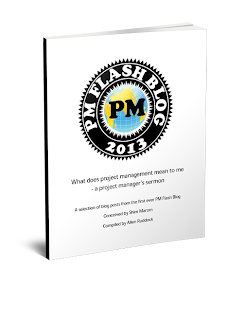I've often said the game of American football is a game of precision informed by inaccuracy.
From sometimes 25 yards away, in the split of a second, among the tangle of potentially 20+ actors all scrambling, a referee makes a judgment (hypothesis) about where the tip of an oblong ball happened to be when the action stopped.
Then, a steel chain is laid down to measure off the distance from the tip to the end of the chain (facts). The latter is precise; the former is often wildly a guess, but nonetheless is transformed instantly into "fact"
And, you may ask, what has this to do with project management, or management at all?
It's all about two schools of thought about managing with uncertainty -- managing what we know about risk (or, what we don't know, which is trickier even)
But, the subjectivist begins where an objectivist never would: with a guess (gasp! ... a guess! shocking!)
It's all about two schools of thought about managing with uncertainty -- managing what we know about risk (or, what we don't know, which is trickier even)
- School of objectivity: facts come from what we observe; estimates are derived from experience and projected onto to knowable future circumstances.
Risk is a matter of estimating impact (see: experience) and then applying a probability derived from the facts about how often such has occurred before.
This is the "frequency-based" view of assessing risk - School of subjectivity: Nothing wrong with observable facts, to be sure. But in the school of subjectivity, it's what you believe to be the case that carries the day. The set of beliefs, however, is not set in stone; in fact, to be a good subjectivist, you have to be willing to update your beliefs in the context of new facts (observations)
But, the subjectivist begins where an objectivist never would: with a guess (gasp! ... a guess! shocking!)
- But, a guess about what? Not "facts", of course, but rather a guess (conjecture) about a hypothesis of the circumstances that might lead to facts (observables).
- Or, if there are observables, then a guess about the circumstances (hypothesis) that led to those observables.
- Either way, if the hypothesis is discoverable, or verifiable, then new facts are predictable.
- Hypothesis, and
- Hypothesis (conjectured or validated) given some observables
- Facts, and
- Facts (or new facts) given that a hypothesis is actually valid
If you are one that wrestles with the four above, then you are not only a subjectivist, you are a Bayesian, and you reason according to Bayes theorem
And, you may not have known that you were either a Bayesian or a subjectivist!
Read in the library at Square Peg Consulting about these books I've written
Buy them at any online book retailer!
Read my contribution to the Flashblog

